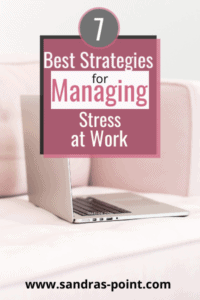 Find out about the Best Ways to Reduce Stress at Work – and Get Your Really ToDo Planner PDF for Free
Find out about the Best Ways to Reduce Stress at Work – and Get Your Really ToDo Planner PDF for Free
Stress at work has a great impact on the mental and physical health of an employee. Furthermore, it increases dissatisfaction in the workplace, leads to a high fluctuation, and increases the error rate drastically.
Even though it is easy to keep the stress level for an employee as low as possible, most of the employers won’t know about it or they don´t even care. But there are things you can do to avoid stress. Find out about these simple techniques in the following article:
What are the causes of stress at work?
There are times in the workplace where it can get a little hectic, we all know that, right?
The reasons for that can be very simple. For example:
- not very organized structure, people don´t know what they have to do or what their responsibilities are
- a stressful time in the year, maybe during the holidays
- a higher level of competition leads to more pressure to meet all the expectations from the customers
- a higher fluctuation can cause stress. Other co-workers have to help new ones to integrate themselves and have to explain many things which costs extra time.
- not good or not working technical requirements
- a not very established team spirit, much gossiping, and no teamwork can lead to stress that is not very necessary
- lack of education or not well-educated executives leads to mistakes that are time-consuming to correct
What can employers do to reduce stress at work?
Employers should understand that this is a very important topic for the overall performance of their workers. Stress at work can cause many problems. It has a long-term impact on the overall performance of their business. There are a few easy things that can employers immediately do to reduce stress for the employees:
- Really define the responsibilities and communicate that very clearly
- Live by their promises to their employees and keep them
- Have a clear communication structure
- Give their employees the opportunities to work from home if they want to and grant flexible working hours if possible
- If somebody makes a mistake, don´t look for the person that did this. Instead: focus on the solution and not on the problem
The Balance between reducing stress and not hurting your career
When it comes to taking a step back and trying to manage the stress at work, people tend to be afraid because they think that this can actually hurt their career. They are afraid that their boss thinks that they are not as resilient as they should be.
But that is simply the wrong approach to this problem and simply not true. There are many simple ways to take a step back and look out for yourself by managing your stress at work. Check out the following simple strategies:

Best strategies for managing stress at work:
1. Make a plan for the week
Stress at work is oftentimes caused by chaos and overwhelm. This can occur when you do not have a good action plan on what to do next and when you do not focus on the things that are effective and the things you should do.
Maybe you have tasks that you can totally delegate or simply not do. You should always ask yourself how important and how urgent every task is that you have to do. Be smart with your precious time.
By making a plan for the week and adjusting it as you go, you will be more efficient on the things you really have to do instead of doing the things that keep you busy.
A weekly planner helps you to be more productive instead of being just busy. It helps you to categorize your tasks for every weekday and accomplish even more. It keeps you from being overwhelmed and organizes your todos according to their urgency.
 You can sign up here and get your free Really ToDo Weekly Planner PDF.
You can sign up here and get your free Really ToDo Weekly Planner PDF.
It has 9 pages and it will help you plan out your whole week upfront. It helps you organize your tasks and categorize them so that you will use your precious time effectively.
Instead of just being busy and really achieve not much.
You can either print it out as much as you want or use this fillable PDF on your computer.
This way you will always know what comes up next week.
How to use the Really ToDo Weekly Planner:
Step 1: On the first page, write down every task for each weekday and the estimated time you will need for the specific task to be done.
Step 2: Categorize each task:
- A: This is an important and urgent task, that you will do as soon as possible.
- B: This is a task that you will do yourself, but it is not that urgent.
- C: is a task that is not very important, nor urgent. You can either delegate that task, do it later if you have any time left. The best option with that task would be to simply ditch it.
Step 3: Fill out the weekdays with your tasks. Do only three tasks a day.
Step 4: Don´t forget to check the tasks off of your list when you are done and be proud of yourself for what you have accomplished.
By categorizing and planning out the todos for your weekdays you will be more productive, and in the end, you will have more time left for yourself and to take care of yourself. You will also see what comes up every week, without having feeling overwhelm.
Be bold and ditch the tasks that are not very important.
2. Set boundaries
Setting boundaries and saying no to things that you either do not like to do or necessarily do not have to do is necessary when it comes to reducing stress. This applies to your workplace as well as your private life. And both are important.
Choose you. You are first. Dare to say no and set boundaries on the things that are not that important to you or your work.
This way you also teach others how they will treat you along the way. A colleague that always says yes to everything will be asking all the time.
3. Delegate
Try to delegate tasks that are not very urgent or important. This depends, of course, on your situation at work, whether you have an assistant or not. You can also ask someone for help if you have too much to do. (Don´t forget to return the favor).
Keep in mind that you will have to keep an eye on your assistant that everything gets done in time and with the high-quality standard that you will need. It will also cost some extra time to teach your assistant what you actually need.
4. Do not talk to anybody and do not be anywhere
To keep this one simple:
Don´t be anyone’s best buddy. Don´t talk to anybody. Don´t gossip.
This is only time-consuming and it does not make you look very professional.
Go to work, do your job as effectively and fast as possible, go home, and relax. This is the best way to reduce the overall stress at work. Because talking and gossiping costs you only energy and time and it is not doing any good for anybody.
If you want to talk to or about someone – then always say nice things about them. If you don´t have to say anything nice, then don´t talk at all.
Believe me: your boss will notice this.
5. Plan your todos wisely
Use the Really ToDo Weekly Planner to plan out the tasks for the day.
Then be smart about the meetings you will attend to:
- Do urgent and important tasks which need your full attention straight in the morning. This way you can concentrate a lot better.
- Plan your meetings after lunch if possible.
- Only attend meetings if they are really necessary. Remember to set boundaries and say no to endless and pointless appointments.
- Do your phone calls if possible in the evening. Keep it short and straight. Don´t talk longer on the phone as needed.
- Furthermore, avoid phone calls at all. Instead, write a short email with your request if it is appropriate. This is much less time-consuming and more effective. (Sending an email has also the advantage that you have something in writing if you have to remind the receiver of something later on).
- Of course, networking is important for your career, but be smart about it and let´s just focus on reducing your stress at work first.
6. Set your priorities straight
If you feel that you are burning out and have too much stress and even talking to your boss about it nor all the productivity tools in the world are seeming to help – then take some time off.
It sounds odd because most of the time you feel that you can not afford to take a day off or go home earlier. You think that if you do not stay at work and work as much as you can, you will miss deadlines or limit your chances of a promotion.
But in the end, it is simply much smarter to take care of yourself first and start fresh the other day.
To set your priorities straight:
It just works. It is not your family.
At work, you will be replaced in a minute, if you do not perform the way you should.
Do you want to know a place on which you can not be replaced under any circumstances?
At home with your family.
Before you are getting sick or burned out, go home and take care of yourself first.
7. Do your affirmations and think positive
Thinking positive and doing affirmations is also a very effective way to manage and reduce stress at work. Stress starts in your head. You think about what you have to do next and what else you have to do and so on.
This is very stressful. You are chasing yourself from one task to the next. This triggers negative emotions and leads to negative thinking.
You can check out the recent articles about positive thinking here:
How to not let your work get to you
It is very stressful to take your work home with you. What this means is, that people oftentimes still are – in their head- at work, and are thinking about the stuff they have to do tomorrow or what happened that day.
It is important to be aware of that and try to find ways to calm down and get your mind off of work. There is actually a very good book about this topic. It is called “The Power of Now” by Eckhardt Tolle. I highly recommend it. It explains why we should live in the moment and why the reality we live in is now.
Reading is also a very good way to relax your mind and think about something else.
You can also talk to someone in your family or a friend. This will help you to get closure if something happened that you need to talk about. But try to make it short and move on to better topics for conversations.
Conclusion
 Thinking about what your needs are and maintaining a healthy way of managing stress at work is very important for your mental and physical health. You should consider planning and organizing your week ahead and adjust as you go.
Thinking about what your needs are and maintaining a healthy way of managing stress at work is very important for your mental and physical health. You should consider planning and organizing your week ahead and adjust as you go.
You should also set your priorities straight, think positively and find ways to relax after work, and get your mind off of work.
Get Your Really ToDo Weekly Planner PDF
 By being more productive and simply organizing your tasks throughout the week, you will be more productive and have more free time to do what you want and for self-care.
By being more productive and simply organizing your tasks throughout the week, you will be more productive and have more free time to do what you want and for self-care.
You may also like:
How to Start to Think Positive




Comments are closed.